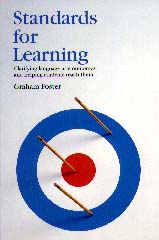|
________________
CM . . . .
Volume V Number 12 . . . . February 12, 1999
excerpt: In attempting to capture the essence of a standards and outcomes emphasis on curriculum, especially in the language arts curriculum, I am reminded of a friend's description of much educational jargon: 'It's like trying to get your hands on a greased hippopotamus!' ... Teachers in several subject disciplines are motivated to get their hands on the outcomes hippopotamus - greased or otherwise.And so begins this slim volume on understanding and implementing an outcomes-based curriculum. Foster's work is really a leisurely essay - logical, calming and persuasive, with pauses for concrete details and ideas. For teachers prepared to read it through from beginning to end, as I did, Foster's points are informative and reassuring. For those looking for quick ideas, or even for specific points to assist with a particular curriculum (such as the new Manitoba English Language Arts documents), Standards for Learning is much less helpful. Foster's book has five chapters, only two of which have any substantial length: "Features of Outcomes Programs," and "Standards, Assessment and Reporting Practice." This latter topic is clearly Foster's strength (see for example his 1996 book, Student Self-Assessment). Alas, the rubrics contained in this chapter, on such useful topics as assessing dioramas, are not aligned to the Western Canadian Common Curriculum Framework, and will, therefore, be less useful than readers might otherwise hope. The other three chapters briefly discuss implications, coordination and implementation of "any newly revised language arts curriculum." There is a good deal of wisdom in Foster's book, but much of it is hidden. The book's structure obscures much of its strength, even as a reflective essay. Standards for Learning lacks structural features to assist the reader. It uses only italics, caps, boxed text and bullets to help direct reader's attention - no colour or even imaginative use of white space. It is less visually appealing than many student projects which regularly cross my desk. Standards for Learning does make some effort to appeal more broadly to "all outcomes based curricula," as promised on its opening pages (see above), but it is still clearly an Alberta, language arts document. As a former Calgary teacher, I sympathize with Foster's point of view. However, I wonder at what possible appeal this book will have for the majority of teachers, in places such as Manitoba, who are well past quiet consideration of the merits of outcomes-based curricula and well into frantic preparation for standards exams. They are in need of specific ideas for specific outcomes rather than Foster's general examples. My reservations aside, Foster's points are useful for me and will assist my interactions with teachers who are trying to implement new curricula. I especially liked his ideas on short-term planning and his focus on the usefulness of exemplars to support assessment. Recommended with reservations. Deborah L. Begoray is an assistant professor in Reading/Language Arts in the Faculty of Education at the University of Manitoba. She is currently assisting pre-service and in-service teachers to implement the Manitoba English Language Arts Curriculum (1996).
To comment on this title or this review, send mail to cm@umanitoba.ca.
Copyright © the Manitoba Library Association.
Reproduction for personal use is permitted only if this copyright notice
is maintained. Any other reproduction is prohibited without
permission.
Published by
TABLE OF CONTENTS FOR THIS ISSUE - FEBRUARY 12, 1999.
AUTHORS |
TITLES |
MEDIA REVIEWS |
PROFILES |
BACK ISSUES |
SEARCH |
CMARCHIVE |
HOME
|

